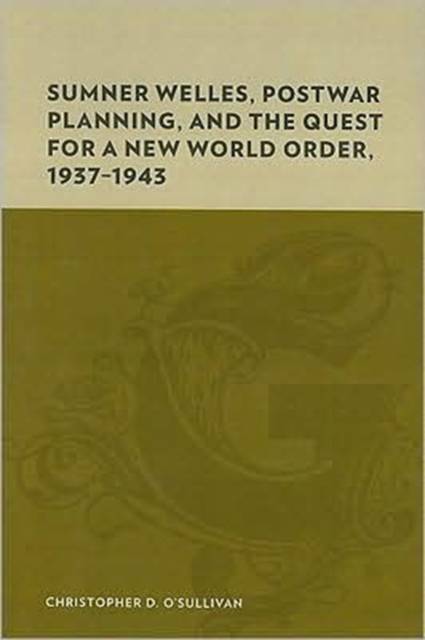
- Afhalen na 1 uur in een winkel met voorraad
- Gratis thuislevering in België vanaf € 30
- Ruim aanbod met 7 miljoen producten
- Afhalen na 1 uur in een winkel met voorraad
- Gratis thuislevering in België vanaf € 30
- Ruim aanbod met 7 miljoen producten
Sumner Welles, Postwar Planning, and the Quest for a New World Order, 1937-1943
Christopher O'SullivanOmschrijving
According to Christopher D. O'Sullivan, there is still much to consider regarding Franklin D. Roosevelt's foreign policy. Exploring the worldview of Sumner Welles, who became one of Roosevelt's chief foreign policy advisors until Welles's tragic and scandalous resignation in the fall of 1943, O'Sullivan portrays an official coldly hostile to all European powers-allies and enemies alike. Welles resolved to create a postwar global Pax Americana based on the model of the Monroe Doctrine. Using a wide range of primary sources-many of them not previously available-O'Sullivan brings to light the deliberate aim of the State Department's planners to guarantee American hegemony in the postwar world.
O'Sullivan explores American plans to build up China, to reconstruct Germany and Japan as postwar engines of economic recovery and integration, and to recreate Iran in the American image. On the question of Cold War origins, O'Sullivan demonstrates how Welles and State Department planners had, by 1943, abandoned a policy designed to block Soviet expansion into Eastern Europe on the grounds that there was little or nothing the United States could do about it. His book deepens our understanding of the so-called "special relationship" between Britain and the United States and makes a significant contribution to the history of the State Department during the Roosevelt era. It also raises larger questions about FDR's foreign policy. Given Roosevelt's tendency to rely on Welles's advice, this volume presents new perspectives on America's war aims. The first scholar to make extensive use of the Sumner Welles papers, O'Sullivan happened to be instrumental in the donation of the papers, which spent more than fifty years in private hands, to the Franklin D. Roosevelt Presidential Library at Hyde Park.Specificaties
Betrokkenen
- Auteur(s):
- Uitgeverij:
Inhoud
- Aantal bladzijden:
- 280
- Taal:
- Engels
- Reeks:
Eigenschappen
- Productcode (EAN):
- 9780231142588
- Verschijningsdatum:
- 24/12/2008
- Uitvoering:
- Hardcover
- Formaat:
- Genaaid
- Afmetingen:
- 160 mm x 231 mm
- Gewicht:
- 566 g

Alleen bij Standaard Boekhandel
Beoordelingen
We publiceren alleen reviews die voldoen aan de voorwaarden voor reviews. Bekijk onze voorwaarden voor reviews.







